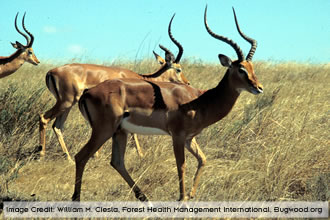Aepycerotinae - impalas
There is one species in this subfamily, the impala. The impala is found from northeast South Africa to Angola, south Zaire, Rwanda, Uganda,and Kenya. It lives in woodlands and grasslands. The impala is a reddish-brown with a white belly and tail. It has black stripes on its tail, on the back of its thights, and on its forehead. It has black-tipped ears and a white line over its eyes. The male impala has long, ridged, S-shaped horns. |
|
 |
World Status Key
 Least Concern Least Concern  Near Threatened Near Threatened  Vulnerable Vulnerable  Endangered Endangered  Critically Endangered Critically Endangered  Extinct in the Wild Extinct in the Wild  Extinct Extinct
Status and range is taken from ICUN Redlist. If no status is listed, there is not enough data to establish status.
US Status Key
 Threatened in US Threatened in US  Threatened in NH Threatened in NH  Endangered in US Endangered in US  Endangered in NH Endangered in NH  Breeds in NH Breeds in NH  Introduced Introduced
Status taken from US Fish and Wildlife and NH Fish and Game
New Hampshire Species |
|
North/Central American Species |
None
|
|
None |
Additional Information
Key:  Profile Profile  Photos Photos  Video Video  Audio Audio Impala - Aepyceros melampus     
The male impala makes a sound that is a cross between a lion's roar and a dog's bark! Learn more.
Source: African Wildlife Foundation Intended Audience: General Reading Level: Middle School
Impala - Aepyceros melampus     
The impala is found in woodlands and grasslands.
Source: Arkive Intended Audience: General Reading Level: Middle School
Impala - Aepyceros melampus    
Female impala herds can have up to 100 members.
Source: Animal Diversity Web Intended Audience: General Reading Level: Middle/High School
|